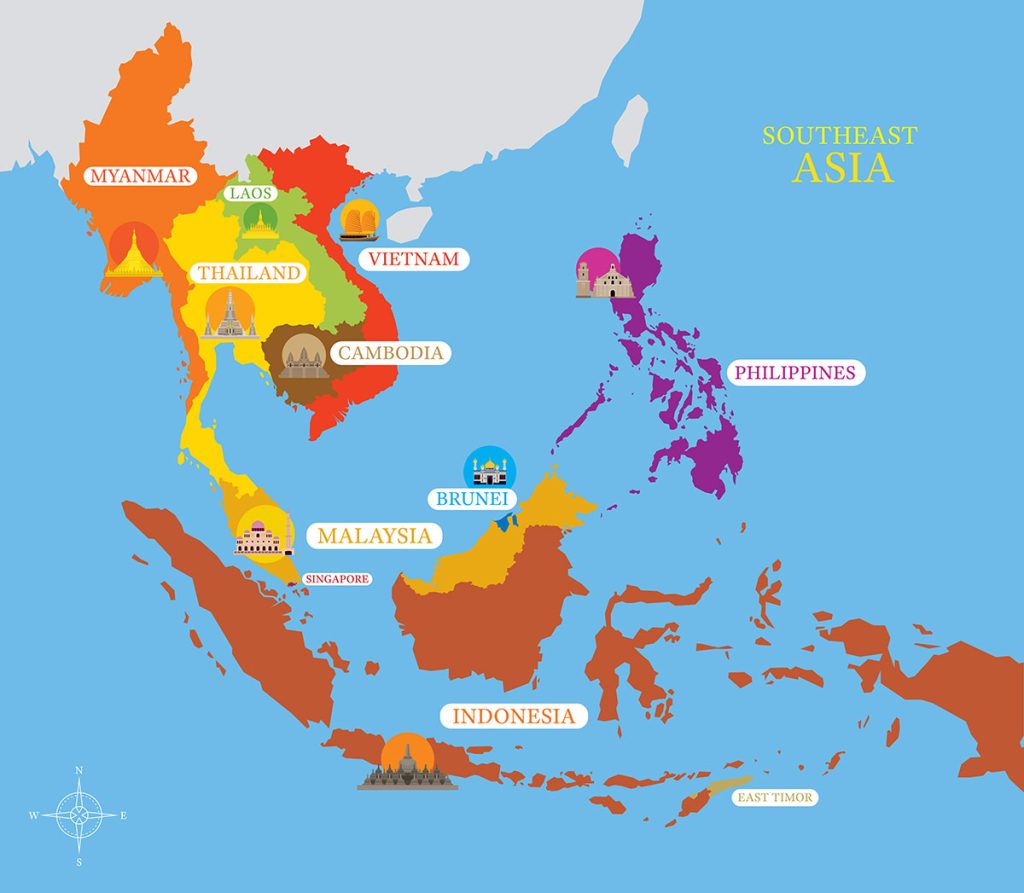
The gig economy has boomed globally since the COVID-19 pandemic, especially in Southeast Asia. The growing reliance of consumers upon on-demand delivery, and the pivoting of livelihoods for millions of people to platform work in the wake of lockdowns and business closures, have made gig work more central than ever to households and economies across the region.
Driven by a combination of technocratic and political concerns including growing worker agitation for improved conditions, policymakers in Global North and Global South contexts alike are being forced to revise the largely ‘hands off’ or laissez-faire approach they’ve taken to the sector over the past decade. This is also the case in Southeast Asia where governments – many of which are autocracies and hybrid military regimes – are grappling with how to respond to the precarious conditions of riders and drivers in the sector. Examining the pathways to and variations in reform approaches in Thailand and Singapore reveals the mechanisms, limits and risks of policy and regulatory change in non-democratic and hybrid regimes. 1

Sidelined workers and regulatory capture
The response of Southeast Asian governments to tensions in the gig economy is shaped by the limited capacity of workers to organise and influence political and policy decision-making. In both Thailand and Singapore, as in many contexts globally, riders and drivers are constrained by laws which require workers to be legally considered ‘employees’ to form trade unions. As labour law in both contexts continues to define gig work as outside traditional employment relations, riders and drivers have turned to informal associations and networks to organise collectively. The lack of formal legal structure is compounded by the hybrid autocratic context of both regimes which has ensured that parties and politicians representing gig worker concerns have been excluded from ruling coalitions over the past decade.
Given weak worker influence over policymaking, platform companies have had a disproportionate influence over regulation of the sector in both contexts. Frustrated by their sidelining workers have begun to mobilise to pressure ruling elites for reform and intervention into the sector. Often coordinated via online groups, in recent years these movements have evolved from mutual aid activities into collective actions aimed at forcing company concessions and, increasingly, demanding governments action. In both countries these pressures have resulted in some policy progress. Yet, interventions reflect the political dominance of commercial elites and companies – highlighting the limits of reform in hybrid regimes with entrenched dynamics of collusive state-business relations.
Thailand’s pro-competition approach spurs worker mobilisation
The hybrid military regime which governed Thailand for a decade following a coup in 2014 took a largely pro-competition, innovation-focused approach to platform capitalism. Throughout the past decade the country has seen a massive boom in regional and local platforms. Food delivery apps in particular have seen rapid growth with the sector valued at more than US$4 billion by end of 2021, reflecting growing consumer reliance on delivery both during and since the COVID-19 pandemic. 2 As regional giants such as Grab and GoJek have attempted to expand their presence into the Thai market in the past decade backed by global speculative capital, local platforms have also emerged – including RobinHood financed partly by monarchy-linked Siam Commercial Bank.

The intensification of competition in the Thai gig economy – especially since the COVID-19 pandemic – has made safety nets for workers in the sector more rather than less precarious. 3 Prior to 2020 the market was largely dominated by Grab which automatically offered protections such as accident insurance to its Thai-based workers as it did in other markets in the region. However, in the absence of regulations legally requiring the provision of these safety nets the entry of new platforms in recent years meant companies began to use basic accident protection to lure Thai riders and drivers into working exclusively with their platform. A rider turned activist I interviewed in June 2022 described these shifts since 2019, outlining how he previously needed to complete 300 deliveries – around 10 jobs or about 5 hours of work every day of the month – on a single app in order to secure accident protection from that platform:
“We have to constantly juggle incentives across the various apps whilst making sure that we do enough jobs with one app to make sure we have accident protection that covers us for lost income if we can’t work due to an injury. It’s basically a game of Mission Impossible, but it’s not a game – it’s our lives!”.
In a context where formal union formation remains legally restricted and both ruling conservative elites and the monarchy are directly invested in the sector, workers have struggled to get the ear of policymakers. In 2020, for instance, the military-appointed Minister of Labour convened a meeting with all major platforms to develop a strategy for the sector during the pandemic. However, according to gig-workers interviewed in July 2022, rider and driver associations were excluded from these meetings. The Minister of Labour instead referred any collective attempts at policy advocacy by gig workers to a section of the ministry focused on the informal sector.
Unsurprisingly given the lack of collective worker consultation, Thai policymakers have taken a hands-off approach both to exploitative algorithms and precarious conditions. Instead, they have tended to view gig work as an innovative market-based fallback for workers laid-off during downturns; and platform capitalism more broadly as modernising the largely informal restaurant, hospitality and delivery sector. Rather than interfere in this creative disruption Thai ministries since COVID-19 have responded to worker complaints by encouraging competition in the sector and urging platforms to (voluntarily) provide safety nets such as accident insurance for workers. 4
Frustrated by the government’s reluctance to listen to or act on their regulatory demands, gig worker organisations have begun to emerge offline and online – with some aligning themselves with the broader pro-democracy movement. 5 The policy platform of the progressive Move Forward Party at Thailand’s May 2023 election reflected the outsized role of gig-workers in the party’s base. Move Forward won the largest number of seats but for now at least has been forced into opposition by a ‘Frankenstein’ government bringing together conservative military and business elites with the ostensibly reformist Pheu Thai Party. 6 It remains to be seen if the gig work policies of Move Forward will be embraced or coopted by Thailand’s new government. If the political lockout of Move Forward results in little improvement for informal sector and gig workers it is very likely that demands to junk Thailand’s hybrid autocratic regime will intensify in coming years. 7
Singapore’s technocratic response to electoral shock
Singapore’s People’s Action Party (PAP) government similarly took a laissez-faire approach to platform capitalism for the first decade following its emergence. Beyond requiring that platform apps not exclude traditional taxis from their booking options – encouraging platformization of the entire private hire sector – policymakers have been reluctant to intervene into labour-company disputes. Meanwhile state-owned companies directly supported the expansion of platform giant Grab throughout Southeast Asia with a founding investment in 2014. 8 This permissive governance and investment context enabled the rapid expansion of platform apps, especially Grab and later Indonesian platform GoJek, across the region.

With the onset of the pandemic in early 2020, however, it became clear that the ambiguous employment status of ‘on-demand’ workers and insufficiency of company-provided safety nets was provoking mobilisation by frustrated Singaporean workers. During the early 2020 COVID-19 ‘Circuit Breaker’ in Singapore, for instance, a SG$77 million package of government and industry assistance was announced for distribution to workers who earned income through platform apps such as Grab, GoJek and FoodPanda. Reflecting the hands-off approach of the government and the scheme, these funds were distributed by and through platform companies rather than state institutions. An uproar ensued, however, when Grab management attempted to use dispersal of the funds to reward only its most loyal drivers while phasing out an existing incentive scheme. Outraged drivers responded with an unusual collective mobilization in which they claimed Grab was self-interestedly managing pandemic relief funds to the exclusion of some gig workers. 9 The company ultimately abandoned the initial approach to dispersal. A few months later, in July 2020, the PAP lost several seats at the national election to the Workers Party which had run on a platform advocating the introduction of a national minimum wage, including for gig workers.
The pro-market PAP has governed the country continuously since independence from Malaysia in 1965, aided both by state mediation of most voters’ housing and heavily pro-incumbent electoral and party regulations. 10 Yet in response both to worker frustration and the WPs stronger-than-expected electoral showing in 2020, Singaporean government agencies began to draw up a regulatory response to the gig economy. In August 2021 the Prime Minister’s National Rally Day called out the ‘employee-like’ conditions of gig workers and formed an Advisory Committee which in mid-2022 made a dozen recommendations for reform – all of which were adopted in principle by the Singaporean government.
Rather than responding directly to the demands of workers the proposed reforms reflect a largely technocratic concern that gig workers may fall between the cracks of Singapore’s social model and pose a cost risk in the future to the government. Building on existing requirements that workers contribute to their individual medical savings fund, since the pandemic the government’s flagship interventions into the sector have focused predominantly on two areas: accident insurance and retirement savings.

As of 2023 platform giants operating in Singapore are now mandated to take out insurance which provide workers with compensation if they have an accident whilst on the job. Importantly, the compensation paid in the event of an accident must be equivalent to income earned previously across all platform apps (rather than just the platform they were working for at the time of the accident). As most workers regularly take jobs with two or three different platforms depending on bonus fees and other incentives the reform is market-enabling as it corrects the failure of platforms to coordinate and delivers basic safety nets critical to sustaining the labour-force across the sector.
Retirement fund reforms have also been implemented which require platforms and gig-workers under 30 years old to make contributions to a government-regulated savings account – Central Provident Fund (CPF) – from 2024. CPF are funds which workers can use to purchase a subsidised apartment from the state-run Housing & Development Board (HDB). HDB acquisition is essential to Singapore’s ‘self reliance’ social contract in which individuals are encouraged to purchase subsidized private housing from the state and then later sell that property (hopefully at profit) decades down the line to privately fund their retirement and aged care. 11
Requiring gig-workers and companies to make CPF contributions for income earned in the gig-economy is a long-term cost-saving intervention for the state as it reduces the potential demands of low-income workers for government support later in their lives. Yet as one group of rider-activists have pointed out on social media, there is nothing in the new regulations to stop platforms reducing or removing fares to recoup the costs of fulfilling these new requirements. 12 The result is that workers in the sector may end up shouldering the burden of their own and their employer’s contributions. In late 2022 the Minister responsible for the reforms acknowledged this possibility but defended the approach – claiming that gig-workers can earn ‘above-average’ incomes and thus regulation to ban companies passing on costs of contributions to riders and drivers was not necessary. Singapore’s post-COVID reforms to the gig-economy thus reflect a reactive, pro-business and technocratic approach to the sector despite the growing tensions in the sector, especially since the pandemic.
Digitalization and innovation at what cost?
Post-COVID governance responses in Southeast Asia to the inequities and tensions in the gig economy highlights how alliances of state and business shape the perceived risks of growing labour unrest. Whether a new deal for gig workers and the informal economy more broadly emerges from the new Thai political landscape remains to be seen, especially as MF now finds itself locked out of government. What is clear is that worker demands for reform are colliding with ongoing efforts to digitalize economies supported by state agencies and political and economic elites. As workers form new alliances at national and regional level to press for change, inaction could provoke backlash not just to ruling parties but also to the cosy state-business relations that have underpinned these hybrid regimes for decades.
Gerard McCarthy
International Institute of Social Studies, The Hague
Banner: Food Pander worker in Singapore carrying two thermal bags to earn more per trip. Photo: David Sing, Shutterstock
Notes:
- Seven out of ten ASEAN member states can be classified either as electoral authoritarian (Cambodia and Singapore) or as closed autocracies (Brunei, Laos, Vietnam, Myanmar, and Thailand). For discussion see Croissant, A. 2022. https://link.springer.com/chapter/10.1007/978-3-031-05114-2_1 ↩
- For a review, see https://thelowdown.momentum.asia/country_sector/food-delivery-platforms-in-southeast-asia-2022/?option=2021-southeast-asia&code=14379 ↩
- For useful empirical overviews of labour conditions in the Thai gig-economy, including sub-segments of the sector such as domestic workers and growth in the solidarity economy, see https://justeconomylabor.org/jeli-pushing-forward-the-national-task-force-on-gig-workers/ [accessed 10-09-2023] and https://www.ilo.org/global/topics/cooperatives/news/WCMS_869002/lang–en/index.htm [accessed 10-09-2023] ↩
- he Thai Ministry of Commerce, for instance, has provided small grants to worker-led efforts to develop cooperative apps that offer fairer conditions such as minimum delivery fees to riders. These apps are at an obvious disadvantage in comparison to highly resourced companies, yet they have been able to attract considerable market share in a few neighbourhoods of Bangkok and plan to expand elsewhere in the country. Other agencies such as the Department of Older Persons have formed partnerships with platforms to encourage needy older people to turn to gig-work. ↩
- On worker mobilisation and discourses of innovation in Thailand see Mieruch, Y. and McFarlane, D. 2022. Gig Economy Riders on Social Media in Thailand: Contested Identities and Emergent Civil Society Organisations. Voluntas. On the role of gig worker in the pro-democracy movement see https://novaramedia.com/2021/10/11/students-and-gig-economy-workers-are-uniting-to-fight-capitalism-in-thailand/ [accessed 4/09/23] ↩
- For discussion of Thailand’s post electoral political landscape see https://kyotoreview.org/issue-36/the-absence-of-any-move-forward-in-thailand/ ↩
- For examination of the constitutional constraints to progressive democratic governance in Thailand see https://www.eastasiaforum.org/2023/08/05/thailands-constitution-works-as-intended-to-frustrate-democratic-outcomes/ [accessed 08/10/23] ↩
- See https://www.financeasia.com/article/how-vertex-lured-grab-to-singapore/436929 [accessed 8/10/23] p. ↩
- Available at: https://www.straitstimes.com/singapore/transport/grab-u-turns-on-move-to-drop-driver-incentives-when-virus-aid-package-kicks-in [accessed 5/10/23]. For analytical discussion of controversy around the scheme and worker mobilisation see Anant, R. 2020. ‘The Discursive Politics of Labour Regimes: The Contested Emergence of On-Demand Digital Platform Labour in Singapore’. Masters Dissertation. Department of Geography, National University of Singapore, pg. 105. ↩
- See Weiss, M. 2020. The Roots of Resilience: Party Machines and Grassroots Politics in Singapore and Malaysia. Singapore: National University of Singapore Press and Ong, E. 20222. Opposing Power: Building Opposition Alliances in Electoral Autocracies. Ann Arbor: University of Michigan Press. ↩
- See Beng-Huat, C. 1997. Political Legitimacy and Housing: Singapore’s Stakeholder Society. London: Routledge and Beng-Huat, C. 2017. Liberalism Disavowed: Communitarianism and State Capitalism in Singapore. Singapore: National University of Singapore. ↩
- Author screengrab of public post, January 2023. ↩
